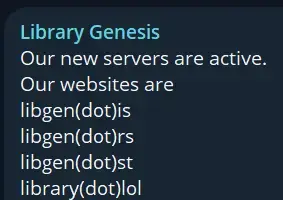clbottomt when the chtopt shows up [imagine this as that popular GIF meme]
antonim
And that's more or less what I was aiming for, so we're back at square one. What you wrote is in line with my first comment:
it is a weak compliment for AI, and more of a criticism of the current web search engines
The point is that there isn't something that makes AI inherently superior to ordinary search engines. (Personally I haven't found AI to be superior at all, but that's a different topic.) The difference in quality is mainly a consequence of some corporate fuckery to wring out more money from the investors and/or advertisers and/or users at the given moment. AI is good (according to you) just because search engines suck.
AI LLMs simply are better at surfacing it
Ok, but how exactly? Is there some magical emergent property of LLMs that guides them to filter out the garbage from the quality content?
If you don't feel like discussing this and won't do anything more than deliberately miss the point, you don't have to reply to me at all.
they’re a great use in surfacing information that is discussed and available, but might be buried with no SEO behind it to surface it
This is what I've seen many people claim. But it is a weak compliment for AI, and more of a criticism of the current web search engines. Why is that information unavailable to search engines, but is available to LLMs? If someone has put in the work to find and feed the quality content to LLMs, why couldn't that same effort have been invested in Google Search?
Here in my southeast European shithole I'm not worrying about my tax money, the upgrade is going to be pretty cheap, they're just going to switch from unlicensed XP to unlicensed Win7.
Yep, but I didn't mention that because it's not a part of the "Wayback Machine", it's just the general "Internet Archive" business of archiving media, which is for now still completely unavailable. (I've uploaded dozens of public-domain books there myself, and I'm really missing it...)
You can (well, could) put in any live URL there and IA would take a snapshot of the current page on your request. They also actively crawl the web and take new snapshots on their own. All of that counts as 'writing' to the database.
it is quite literally named the “land of the blacks” after all that is what Egypt means
Egypt is from Greek and definitely doesn't mean that. The Egyptian endonym was kmt (traditionally pronounced as kemet), which is interpreted as "black land" (km means "black", -t is a nominal suffix, so it might be translated as black-ness, not at all "quite literally land of the blacks"), most likely referring to the fertile black soil around the Nile river. Trying to interpret that as "land of the blacks" should be suspicious already due to the fact people would hardly name themselves after their most ordinary physical characteristic; the Egyptians might call themselves black only if they were surrounded by non-black people and could view that as their own special characteristic, but they certainly neighboured and had contact with black peoples. And either way one has to wonder if the ancient views of white and black skin were meaningfully comparable to modern western ones. On the other hand, the fertile black soil most certainly is a differentia specifica of the settled Egyptian land that is surrounded by a desert.
More screenshots are here: https://xcancel.com/p9cker_girl/status/1844203626681794716
What I find odd is that the message that they actually left on the site has nothing to do with Palestine, just childish "lol btfo" sort of message. So I wouldn't be surprised if these guys aren't the ones who actually did it, and it's merely a false flag to make pro-Palestinian protesters look like idiotic assholes.

Yeah, totally makes sense, "they" attacked IA one month in advance before the elections, knowing that IA would spend around a month rewriting and improving their site code until the Save Page option would be enabled again (unless IA themselves are a part of the plot???), so that news articles could be "edited on the fly" (with what result?) until the election day, while other similar web archiving services such as archive.is would keep working just fine.